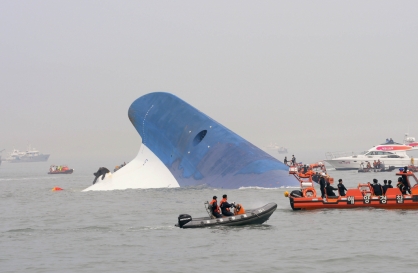Most Popular
Korean History
-
1
2014 ferry disaster left scars that never healed

-
2
In 2012, K-pop makes leap from 'Gangnam' to the world

-
3
Deadly sinking of Navy ship in 2010 marks worst postwar military disaster

-
4
In 2008, Korea's National Treasure No. 1 went down in flames

-
5
In 2005, science world’s biggest scandal unravels in Seoul

[Korean History] A tale of two Koreas at the UN
After several setbacks, S. Korea in 1991 joins the UN along with NK, making de facto declaration of coexistence
By Jung Min-kyungPublished : July 12, 2023 - 11:17

The United Nations holds a special position in South Korea’s modern history.
From the nation-building process following the liberation from the 1910-45 Japanese occupation to the 1950-53 Korean War and postwar recovery and reconstruction efforts, the global governance body played a crucial role by providing South Korea with military and humanitarian assistance.
Yet, it wasn't until 1991 when South Korea officially became a member. Joining alongside North Korea, it was the 161st to join the New York-based body, which now has 193 members.
Long road for UN seat
As a sovereign state, the South Korean government had long sought a UN membership. But its repeated appeals for a seat were hampered by the intense Cold War rivalry that permeated the international body at that time.
From 1949 to 1975, Seoul submitted five membership applications and had three resolutions introduced on its behalf, all of which were blocked due to opposition from the Soviet Union.
Similarly, North Korea had knocked on the UN’s doors in vain, with two membership applications being rejected and two resolutions calling for its admission yielding no results. It was the US and Western nations that vetoed the North’s applications.
The two Koreas had to settle for a non-voting UN observer status till the Cold War came to an end.
On Sept. 17, 1991, the 46th General Assembly unanimously approved the motion to admit the two Koreas, along with five other countries -- Estonia, Latvia, Lithuania, the Marshall Islands and the Federated States of Micronesia.
The Korea Herald dedicated its front page to an article titled "South, North Korea join the UN" to celebrate the diplomatic milestone.

"South and North Korea finally became UN members 42 years after they first applied for membership in 1949, paving the way for a new era for the two rivals," the article said.
The article not only celebrated the diplomatic achievement, but also highlighted its symbolic meaning marking the end of the Cold War.
"The entry into the world body of the seven countries reflects the revolutionary changes that have swept the Soviet Union and altered the diplomatic landscape fashioned after World War II," it read.
Lee Sang-ok, Seoul’s foreign minister at that time, said in his speech following the admission that their joining "would open a new chapter not only in inter-Korean relations but also mark a new beginning and a chance to finally remove the last vestiges of the Cold War."
Inter-Korean relations on new footing
To be admitted to the UN, a country needs the support and votes of a two-thirds majority of the existing members. Supreme Council members, however, can exercise their veto to block the entry of a particular state.
In their early attempts to join the UN, both Koreas wanted to be the sole Korean representative, each claiming to be the sole legitimate state representing the entirety of the Korean Peninsula. They still assert so, at least in their respective constitutions.
South Korea was the first to drop its bid for a unified UN membership in 1973, even declaring that it would not oppose the North’s bid for its own separate seat. The North clung to its previous stance until May 1991.
In the late ’80s and heading into the ’90s, the world was seeing the collapse of the Cold War system, with a bipolar struggle between the US and the Soviet Union blocs giving way to a new order of multilateralism. In tandem with the changing world dynamics, South Korea, under then President Roh Tae-woo, expanded its diplomatic horizon and established ties with the then socialist bloc in Eastern Europe and even the Soviet Union.
The 2021 hit film "Escape from Mogadishu," directed by Ryoo Seung-wan, depicts the diplomatic rivalry that played out between the two Koreas at this time.

Inspired by actual events, the film tells the story of two groups of diplomats -- one from South Korea and one from North Korea -- in the Somali capital in 1991, caught in the crossfire of a civil war. The envoys, who were there initially to compete for the African country’s support for their respective country’s entry to the UN, decided to set aside their differences for a safe joint escape from the strife-ridden capital.
In real life, the North in May of 1991 gave up on its previous stance of a unified UN membership for a divided Korea. It was because the Soviet Union, in its final months before collapsing later that year, and China showed little interest in thwarting the South’s bid for an independent UN seat.
In a 2021 report, published by the Korea Economic Institute of America, researchers write that the South, despite claiming in theory as the sole legitimate government on the Korean Peninsula, “has been more pragmatic than the North in dealing with the realities of the divided peninsula.”
Koh Yu-hwan, president of the Seoul-based Korea Institute for National Unification, explains that the two Koreas’ simultaneous UN entry, which was followed by the adoption of the so-called Basic Agreement between the two Koreas in December that year, was in effect “declarations to the world that two separate states exist on the Korean Peninsula.”
In the think tank's monthly journal “Peace + Unification,” he writes that the separate admissions were a step aimed at winning international recognition of two Koreas’ co-existence, while the Dec. 13 inter-Korean agreement on reconciliation and nonaggression solidified and institutionalized this notion of co-existence within their own nation.
After their admissions were approved, foreign ministers of the two Koreas each addressed the UN assembly, expressing hopes that someday in the future, the two would need just one seat.
"Confidence built through dialogue and cooperation within the UN framework will certainly move us closer toward durable peace and eventual reunification," Seoul’s Foreign Minister Lee said in his speech.

Two Koreas' current standings in the UN
Since its joining the UN, South Korea has expanded its foothold in the international body.
The country, which was once its aid recipient, is now the ninth-largest contributor to the UN's regular and peacekeeping budgets, assuming 2.57 percent of the total funding for the 2022-24 period.
The country has participated in UN peacekeeping activities, starting with the dispatch of a construction engineer battalion to Somalia in 1993. Currently, over 500 military and civilian personnel are deployed overseas, including 252 in Lebanon and 266 in South Sudan, on UN missions.
Ban Ki-moon, a former South Korean foreign minister, served as secretary-general of the UN for two terms from 2007-2016.
In June this year, the country was elected as a nonpermanent member of the Security Council for a two-year term from 2024-2025. It will mark South Korea's third return to the UN's most powerful decision-making body that has the authority to impose sanctions. The last time South Korea was part of the UNSC was in 2013-2014.
Meanwhile, North Korea is frequently in the spotlight at the UN as the target of its sanctions and condemnations -- mostly for its weapons of mass destruction programs and dire human rights conditions.























